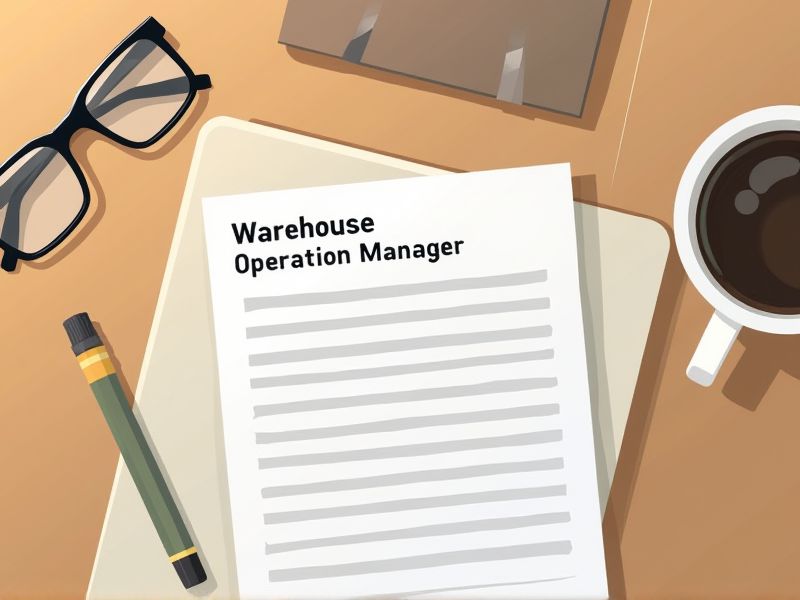
Warehouse Operations Managers oversee logistics, which significantly impacts organizational efficiency and cost-effectiveness. Certifications validate their knowledge in inventory management, safety protocols, and supply chain optimization, ensuring adept handling of complex operations. With evolving industry standards, certified managers gain credibility and a competitive edge. Below are key certifications that may be essential for a Warehouse Operations Manager.
APICS Certified in Production and Inventory Management (CPIM)
The APICS Certified in Production and Inventory Management (CPIM) certification equips a Warehouse Operations Manager with a comprehensive understanding of inventory management principles. This knowledge enhances the manager's ability to optimize inventory levels, reducing carrying costs and improving warehouse efficiency. A deeper grasp of production strategies ensures alignment between warehouse operations and broader supply chain goals. As a result, the manager gains improved skills in demand forecasting, leading to better inventory planning and reduced stockouts.
APICS Certified Supply Chain Professional (CSCP)
The APICS Certified Supply Chain Professional (CSCP) credential provides a comprehensive understanding of integrated supply chain management, essential for optimizing warehouse operations. A Warehouse Operations Manager with CSCP certification can streamline logistics operations by implementing best practices, leading to increased efficiency and cost savings. The certification equips managers with the skills to leverage technology in inventory management, resulting in improved accuracy and reduced waste. Enhanced knowledge from the CSCP program allows a manager to effectively collaborate with suppliers and stakeholders, ensuring a smooth flow of goods and materials.
APICS Certified in Logistics, Transportation and Distribution (CLTD)
Earning the APICS CLTD certification enhances a Warehouse Operations Manager's understanding of logistics, transportation, and distribution, leading to more efficient operations. This credential ensures the manager is equipped with industry best practices, which directly improve supply chain performance. A CLTD-certified manager is more adept at managing complexities related to inventory and transportation. Consequently, the organization can achieve cost reductions and improved service levels.
Occupational Safety and Health Administration (OSHA) Certification
Warehouse Operations Managers require OSHA certification because it ensures they have a comprehensive understanding of safety regulations and standards crucial for maintaining a safe work environment. Proper training reduces the risk of workplace accidents and injuries, thus increasing overall operational efficiency. Certification demonstrates a commitment to safety, which can boost employee morale and trust. Familiarity with OSHA standards helps managers stay compliant with legal requirements, avoiding costly penalties for the organization.
Lean Six Sigma Green Belt
Implementing Lean Six Sigma Green Belt in warehouse operations can lead to improved process efficiency, effectively reducing errors and waste. The enhanced skill set allows the manager to identify and eliminate bottlenecks, consequently increasing throughput and productivity. Data-driven decision-making becomes increasingly reliable, fostering a more agile operational environment. Employee engagement can be boosted as team members participate in problem-solving initiatives, improving overall team performance.
Lean Six Sigma Black Belt
Implementing Lean Six Sigma Black Belt principles enables a Warehouse Operations Manager to streamline processes, reducing waste and inefficiencies. Enhanced data-driven decision-making leads to improved accuracy in inventory management and reduced operational costs. It ensures a consistent level of quality and service by minimizing defects and errors in workflows. The strategic focus on continuous improvement fosters a culture of excellence and adaptability in dynamic market conditions.
Forklift Operator Certification
Forklift Operator Certification contributes to reduced workplace accidents, ensuring a safer environment in warehouses. Certified operators demonstrate a clear understanding of proper handling techniques, which decreases the risk of damage to inventory and equipment. Warehouse Operations Managers can efficiently oversee logistics if they comprehend the practical aspects of forklift operations. Certification serves as a benchmark for skills, providing assurance of compliance with industry regulations and standards.
Certified Safety Professional (CSP)
Certified Safety Professional (CSP) credential equips a Warehouse Operations Manager with essential knowledge of safety regulations and risk management, promoting a safer work environment. This certification helps in reducing workplace accidents, subsequently lowering insurance and compensation claims. Implementing best safety practices enhances operational efficiency, thereby increasing overall productivity. A CSP designation often improves a manager's credibility, which can lead to higher organizational trust and compliance with legal standards.
Certified Professional Logistician (CPL)
The CPL certification provides warehouse operations managers with a comprehensive understanding of logistics, enhancing their ability to streamline processes efficiently. This certification offers credibility and signifies a mastery of logistics that can lead to improved operational performance. With a focus on strategic planning and supply chain optimization, CPL holders are better equipped to implement effective inventory management practices. Their expertise contributes to cost savings, reduced downtime, and increased customer satisfaction in warehouse operations.
Project Management Professional (PMP)
Warehouse operations involve complex logistics, requiring efficient coordination and allocation of resources. A PMP certification equips managers with standardized methodologies and tools necessary for optimizing workflow and reducing inefficiencies. Implementing PMP principles improves timeline management and budget control, ultimately enhancing operational efficiency. In the competitive logistics industry, PMP-certified managers can significantly improve project success rates and customer satisfaction.
Summary
By acquiring certifications, you can enhance your skills and knowledge, leading to more efficient warehouse operations. These qualifications may boost your credibility and authority in the workplace, influencing your team's performance. Increased efficiency often results in cost reductions and improved resource management. With certifications, you can also improve career prospects and potentially advance into higher leadership roles.
